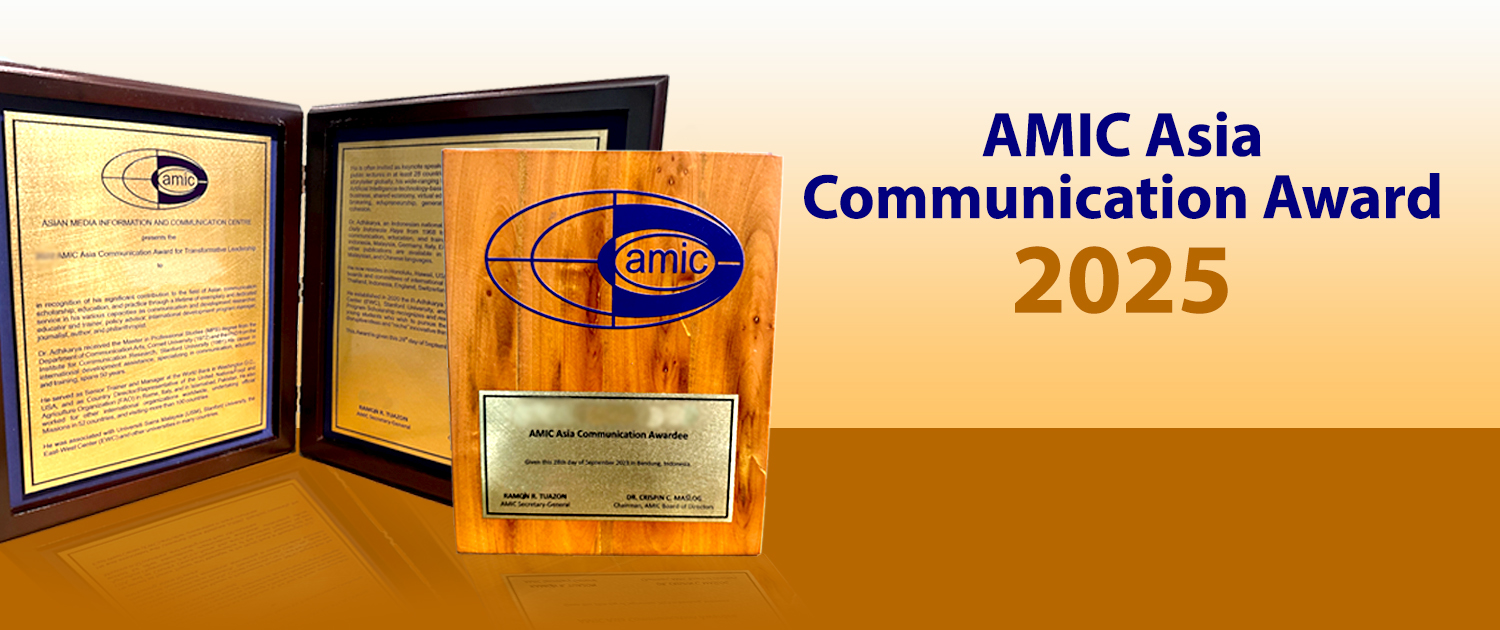
AWARD BRIEF
2025 AMIC Asia Communication Award
The Asian Media Information and Communication Centre, Inc. (AMIC) is an international non-government organization (NGO) committed to communication media development in the Asia-Pacific region.
Established in 1971 as a non-profit NGO and a registered charity in Singapore, AMIC promotes an ethical and socially responsible communication media sector committed to the tenets of freedom and democracy in a socio‐culturally diverse region.
AMIC envisions itself to be the premier Asia-centered policy provider, resource platform, and training institution, for communication media education, research, and professional development.
It seeks to provide a platform for and facilitate the development, sharing, and exchange of learning resources on communication media within and outside Asia.
AMIC’s mission is to nurture and promote communication media research, capacity building, knowledge management, and dialogue among academics, industry, government, and civil society.
AMIC seeks the development and enrichment of communication theories, models, strategies, and practices reflecting distinct Asian perspectives, building on the contributions of Western models and theories.
AMIC established the AMIC Asia Communication Award in 2006 to recognize outstanding achievements in various media and communication fields and categories. These achievements include contributions to research, education, institution development, and journalism excellence.
Since its inception, the award has been conferred to 25 communication scholars, educators, and practitioners whose contributions have focused on a single country within Asia- or the whole of Asia- While the nominees need not be from Asia-, preferences were and will be accorded to regional actors.
AMIC’s extensive Asian presence spans across six distinct regions, including East Asia and the Pacific, South Asia, North Asia, Central Asia, and West Asia.
Self-nomination is allowed. Posthumous nominations will not be accepted.
DESIRED NOMINEES
Desired nominees for the AMIC Asia Communication Award should have exhibited exemplary contributions and have shown consistent dedication to any of the following areas:
- Journalism Education and Training
- Journalism Practice
- Journalism Studies/Research
- Communication Education and Training
- Communication Media Scholarship/Research
- Communication for Development/Development Communication Practice
- Public/Government Information
- Integrated Marketing Communication (including PR and Advertising)
- Digital Communication/Media (including Internet, Social Media and Artificial Intelligence)
- Others
The following are among the qualities of the AMIC Asia Communication Awardee:
- Commitment to the principles of free and independent communication media/journalism;
- Contribution to Asian communication media/journalism theory and model building and development;
- Excellence in the practice of Asian communication media/journalism profession/discipline;
- Significant contributions to Asian communication media/journalism profession/discipline through research, publications, and institution-building;
- Extensive service and passion for Asian communication education and training;
- Introduction of innovative or pioneering Asian communication media/journalism programs and projects
NOMINATION PROCESS
An individual or organization may nominate a candidate for the Award with the consent of the nominee. The nominator must submit a duly filled-out nomination form and supporting documents. The nominee is expected to assist the nominator in completing the nomination form.
The nomination form may be downloaded here.
Nomination forms, including supporting documents, must be uploaded in the Google Drive folder created by AMIC via this link: https://drive.google.com/drive/folders/1VYwBvikplnSQaRwFDrm2SQASCNGjszcF?usp=drive_link
CRITERIA FOR SELECTION
Professional Qualifications 20 pts.
Contributions to the field and discipline 40 pts.
Impact of Work 20 pts.
Citations & Significance of Scholarship 20 pts.
SELECTION PROCESS
The selection process shall consist of three phases, namely:
- Phase One will be undertaken by a screening committee which will review compliance of entries with the Award requirements and the adequacy of completed nomination forms and supporting documents.
- Phase Two will determine the short-listed nominees (at least three) through a Preliminary Board of Judges composed of representatives from the AMIC Board of Management, AMIC Country Representatives, and international youth organizations.
- Phase Three will be the final selection of the winner by a composite Final Board of Judges. The final Board of Judges shall consist of past AMIC Asia Communication Awardees, representatives from the AMIC Board of Directors and international organizations, and well-known development specialists and communication experts from different countries of Asia.
TIMELINE
The deadline for submission of nomination forms is on April 15, 2025. The schedule of activities is as follows:
| Activity | Schedule | Remarks |
| Evaluation of nomination forms and supporting documents | 1 to 31 May 2025 | Screening Committee |
| Selection of short list of nominees | 01 to 30 June 2025 | Preliminary Board of Judges |
| Selection of awardees for 2025 | 01 to 31 July 2025 | Final Board of Judges |
| Awarding proper | 23 September 2025 | 31st AMIC Annual Conference Committee |
PAST AWARDEES
- John Lent (USA), 2006
- Eddie C. Y. Kuo (Singapore), 2007
- Nora Quebral (Philippines) and Dr. Florangel Rosario- Braid (Philippines), 2008
- Binod Agrawal (India) and Dr. K. E. Eapen (India), 2009
- Hidetoshi Kato (Japan), 2010
- Georgette Wang and Dr. Crispin Maslog (Philippines), 2011
- Tan Sri Dato’ L. Krishnan (Malaysia), 2012
- Alwi Dahlan (Indonesia) and Mr. Jakob Oetama (Indonesia), 2013
- Juan L. Mercado (Philippines), 2014
- Alan Hancock (United Kingdom) and Dr. David Robie (New Zealand), 2015
- Dhavalasri Shelton Gunaratne (Sri Lanka), 2016 (for Research and Education)
- Wijayananda Jayaweera (Sri Lanka), 2017
- Franz Joseph Eilers (Germany) for Transformative Leadership, and Mr. Charlie Agatep (Philippines), 2018 (for Transformative Leadership)
- Leela Rao (India), 2019 (for Teaching Hero Award)
- Dasho Kinley Dorji (Bhutan), 2020 (for Transformative Leadership)
- Wimal Dissanayake (Sri Lanka/USA) 2021 (for Disruptive Inquiry -Communication Research)
- Ronny Adhikarya (Indonesia) 2022
- Arvind Singhal (USA/India), 2023
- Cherian George (Singapore), 2024
